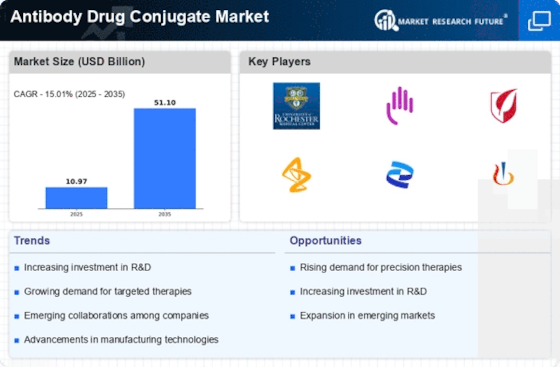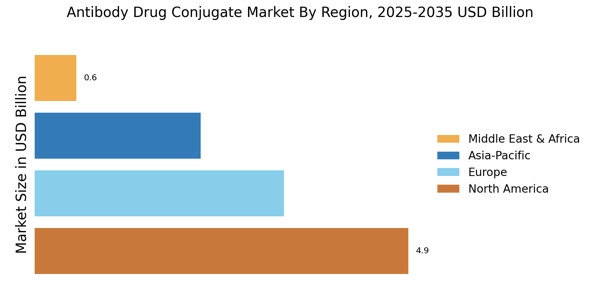Advancements in Biotechnology
Technological advancements in biotechnology are significantly influencing the Antibody Drug Conjugate Market. Innovations in genetic engineering, monoclonal antibody production, and conjugation techniques have led to the development of more effective and safer antibody drug conjugates. For instance, the introduction of site-specific conjugation methods has improved the therapeutic index of these drugs, allowing for better targeting of cancer cells while sparing healthy tissues. The market is witnessing a surge in research and development activities, with numerous clinical trials underway to evaluate new formulations. This dynamic environment suggests that the Antibody Drug Conjugate Market will continue to thrive as biopharmaceutical companies leverage cutting-edge technologies to enhance drug efficacy and safety profiles.
Increasing Prevalence of Cancer
The rising incidence of cancer worldwide is a primary driver for the Antibody Drug Conjugate Market. As cancer remains a leading cause of mortality, the demand for effective treatment options continues to escalate. According to recent statistics, cancer cases are projected to increase significantly, with estimates suggesting that by 2040, there could be over 27 million new cancer cases annually. This alarming trend propels pharmaceutical companies to invest in innovative therapies, including antibody drug conjugates, which offer targeted treatment with reduced side effects. The Antibody Drug Conjugate Market is thus positioned to expand as healthcare providers seek advanced solutions to combat various cancer types, enhancing patient outcomes and survival rates.
Growing Investment in Cancer Research
The increasing investment in cancer research is a crucial driver for the Antibody Drug Conjugate Market. Governments and private organizations are allocating substantial funds to support research initiatives aimed at discovering novel cancer therapies. In recent years, funding for cancer research has seen a marked increase, with billions of dollars directed towards innovative treatment modalities, including antibody drug conjugates. This financial backing fosters collaboration between academic institutions and pharmaceutical companies, accelerating the development of new therapies. As a result, the Antibody Drug Conjugate Market is likely to benefit from a robust pipeline of new products, enhancing treatment options available to patients and healthcare providers.
Rising Awareness of Personalized Medicine
The growing awareness and acceptance of personalized medicine are driving the Antibody Drug Conjugate Market. Patients and healthcare providers are increasingly recognizing the benefits of tailored therapies that target specific cancer types and genetic profiles. This shift towards personalized treatment approaches is prompting pharmaceutical companies to develop antibody drug conjugates that cater to individual patient needs. As a result, the market is witnessing a rise in demand for these targeted therapies, which are perceived to offer improved efficacy and reduced toxicity compared to traditional chemotherapy. The Antibody Drug Conjugate Market is likely to expand as more healthcare professionals advocate for personalized treatment plans, aligning with the broader trend of precision medicine in oncology.
Regulatory Support for Innovative Therapies
Regulatory agencies are increasingly supportive of innovative therapies, which is positively impacting the Antibody Drug Conjugate Market. Initiatives such as expedited review processes and breakthrough therapy designations are designed to facilitate the development and approval of novel cancer treatments. This regulatory environment encourages pharmaceutical companies to invest in antibody drug conjugates, as they can bring these therapies to market more swiftly. The approval of several antibody drug conjugates in recent years underscores this trend, indicating a favorable landscape for future developments. Consequently, the Antibody Drug Conjugate Market is poised for growth as more innovative therapies gain regulatory approval, ultimately benefiting patients in need of effective cancer treatments.

















